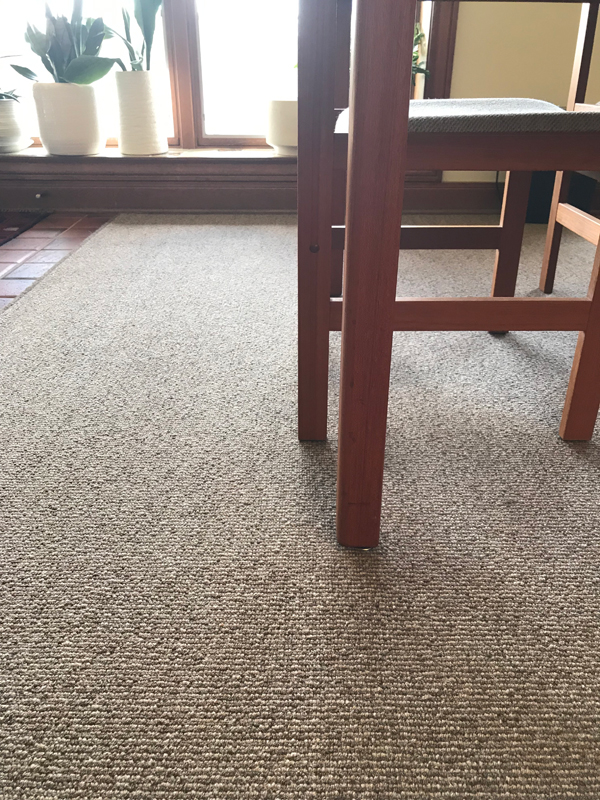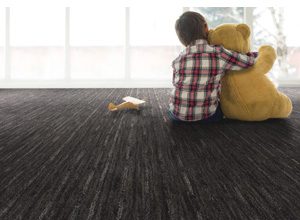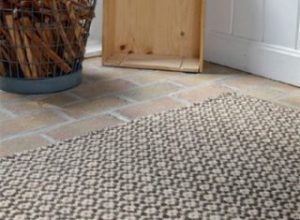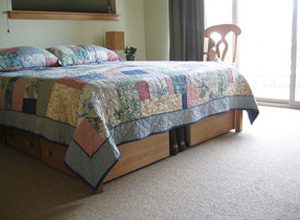Natural Carpet & Rugs
 Why Natural Fiber Carpet and Rugs?
Why Natural Fiber Carpet and Rugs?
Asthma, allergies, multiple chemical sensitivities and environmental illness are on the rise, as people—both young and old—are exposed to low levels of toxic chemicals in their homes, schools, and work places. Health complaints associated with synthetic carpets and carpets made with chemical adhesives include serious neurological, central nervous system and respiratory problems. Two pounds of styrene butadiene latex adhesive—a highly reactive compound—is applied to each square yard of most carpets. Other toxic chemicals found in conventional floor coverings include polypropylene, urethane, synthetic rubber, synthetic dyes, stain repellents, antistatic chemicals, antimicrobials, and pesticides. Most of these chemicals off-gas into the air. Avoiding these airborne toxins is important for everyone concerned with health, and especially families with children who crawl and play on the floor.
Benefits of Natural Wool
Wool fibers are elastic, and when crushed or stretched, their resilience enables them to spring back to their original shape, unlike synthetics that pill and wear in high-traffic areas and matte down beneath furniture. In addition, the scales on wool fibers hold onto dirt until it is vacuumed away, which helps the carpet stay cleaner. And wool fibers absorb airborne pollutants, so wool carpeting can actually help clean the air in your home! Plus wool is fire retardant, so no flame-proofing chemicals are needed.
BEWARE OF GREEN-WASHING… Most wool carpet on the market today is made with toxic chemical adhesives and dyes, synthetic backing, and have pesticides applied, even those promoted as eco-friendly or sustainably sourced. Earth Weave and Nature’s Carpet Dark Green products are the only carpets we have found that are truly non-toxic.
Sustainability / Recycling / Composting
The carpet and rugs we carry are manufactured from renewable resources. Although recycled products are marketed as environmentally friendly, virtually all consumer floor coverings end up in a landfill after use. Earth Weave and Nature’s Carpet products are biodegradable, and unlike floor coverings made from petrochemical-based products like recycled plastic bottles, it can be composted at the end of its useful life and returned to the earth to feed plants and trees.
Nearly four billion pounds of carpet is discarded every year, which accounts for 2% of all solid waste by volume. Two percent may not seem like a large amount, but since carpets are just one among many thousands of waste products that end up in landfills, it represents a huge problem. Some recyclers accept used nylon carpeting; and depending on the fiber and condition some will pick-up and/or recycle it at no charge. Please see https://carpetrecovery.org/recovery-effort/collector-finder-map/ to find a recycler near you or try searching your local and state recycling websites. To find a composter for your old natural fiber carpeting, see the national database of commercial composters at http://www.findacomposter.com.
BEWARE OF GREEN-WASHING… You may have heard of Green Label and Green Label Plus certification. These programs were developed by the Carpet and Rug Institute, a carpet manufacturers’ membership organization. While we applaud efforts to reduce toxic chemicals in carpets, we question the benefit of these certifications because most carpets that are made with petroleum-based materials and emit harmful VOCs are able to qualify for these certifications.





